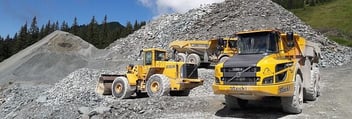Top 7 Responsibilities of a Construction Fleet Manager
Companies both in and and outside the construction industry often use mobile workforces and vehicle fleets. Construction companies utilize fleets of unique vehicles that serve different purposes. The overuse or misuse of vehicle fleets is often ignored and can have a debilitating impact on companies’ finances in the long run.
What is fleet management?
Construction fleet management involves the efficient handling of commercial vehicles to ensure proper use and maintenance. Fleet managers supervise the use of construction vehicles like excavators, forklifts, pick-up trucks, dump trucks, pavers, loaders, and bulldozers.
A construction fleet manager is tasked with acquiring appropriate vehicles for different purposes, registering and licensing them, and maintaining them. A fleet manager has to make sure that the construction company’s vehicles are in excellent shape to keep performing effectively, constantly and inexpensively.
Anyone who wants to fill the role of a fleet manager in construction has to possess the following qualities:
- Efficiency and constant delivery
- Great communication skills
- Good leadership and analytic qualities
- Technical knowledge of the construction industry
- The ability to multitask and prioritize
- Proactivity
- Time management
- Familiarity with the U.S. Department of Transport’s rules and regulations
Bear in mind that in addition to the aforementioned qualities and skills, employers demand certain certifications in relevant fields. The construction fleet manager is to be entrusted with a very significant position, whose important roles are outlined below.
Request a free demo now to learn how Tread’s construction fleet management software can make your job site safer and more efficient.
Roles and responsibilities of a construction fleet manager
1.Making decisions regarding vehicle acquisition
A construction fleet manager is expected to research and decide what vehicle to buy at a particular time based on demand and need. In the case of large vehicles and equipment, the fleet manager bids for them, negotiates with the sellers, and collates prices to find the most favorable option. Sometimes, the fleet manager has to decide between leasing a construction vehicle and buying one.
The construction fleet manager’s decisions should be based solely on what is best for the company’s current construction needs, because the financing of the fleet depends on the choices to be made.
2.Selling off and disposal of used vehicles
As time goes by, construction vehicles reach their usage limit. This is the point where they have served their purpose and have to be replaced with newer and more efficient vehicles. It is the responsibility of the construction fleet manager to make sure that the used vehicles are auctioned off at the best possible prices.
The construction fleet manager is expected to oversee the negotiation and transaction in order to minimize any loss to the company and get the vehicles’ worth.
3.Regular analysis of fleet expense and performance reports
To a fleet manager, analysis of performance reports is a necessity. It helps the manager keep abreast of the fleet’s condition, and assists in speedy detection of any pitfalls or downward spiral in performance or finance. For example, fuelling costs amount to about 30% of a fleet’s total operating cost. Hence, it is important to keep an accurate record of daily expenses to avoid excesses that amount to a great loss over time.
There are software options for fleet truck fuel management purposes; they collect data and record processes that help in the monitoring of a vehicle’s performance. The data gathered by this means is to be analytically screened by the construction fleet manager, who uses the result of the analysis to discover ways of moderating the cost of operations.
4.Hiring and managing qualified drivers for the fleet
Another important responsibility of a construction fleet manager is the recruitment of qualified drivers into the company. The fleet manager hires drivers, trains them to maintain high levels of customer service, and sets efficient schedules that can help increase profit.
The fleet manager must have a clear, logical and well-structured fleet policy that aims to fulfil the purpose of the fleet. This policy brings coordination to the fleet; it contains details on the when and how of handling vehicles, the responsibilities involved, and the company’s dos and don’ts. Oftentimes, the fleet manager has to make sure that the fleet drivers are complying strictly with the policy and schedules and sticking to the maximum hour limits.
Other responsibilities towards staff are ensuring that drivers have necessary in-vehicle mobile devices and approving driver timesheets and pay checks.
5.Guaranteeing the safety of drivers and construction vehicles
One way to avoid regular breakdowns, delays and disappointments during service delivery is by regularly servicing the vehicles in a fleet. This keeps the vehicles in tiptop working shape and notifies the fleet manager of any problems beforehand.
Sometimes, the fleet manager has to keep track of fleet drivers’ driving patterns using specific devices. These devices can help the manager monitor the fleet and find out which ones overspeed, accelerate rapidly or use the brakes harshly. The devices can even detect idling, which can cause deterioration of a vehicle and incur unexpected expenses. GPS systems are also employed for tracking vehicles because they are a great help in situations involving vehicle theft.
Pro Tip: Hold regular safety meetings with your drivers. Find out the topics to cover at your safety meetings.
6.Overseeing the proper maintenance and work readiness of vehicles
To ensure work readiness, the construction fleet manager has to create and follow a maintenance schedule. This schedule serves to preserve the operational capacity of the vehicles and extend their life expectancy.
The scheduling can be facilitated by establishing a maintenance department in the construction company. Another option is making exclusive arrangements with an independent auto-service outfit to oversee the maintenance and repair of fleet vehicles. To promote work readiness, the fleet manager must also make sure that the vehicles stick to industry standards for their use and operation.
7.Supervising the organization of the fleet
Different projects demand different equipment and vehicles. The construction fleet manager supervises the distribution of the workforce towards different projects and decides which equipment is to be relegated to one site or another. For example, when a project requires digging, the fleet manager assigns the excavators and bulldozers to that project because they are the most appropriate equipment.
The fleet manager handles transportation of the construction vehicles to and from a construction site. The storage, housing, and fuel costs of vehicles are all supervised by the fleet manager to ensure that the construction fleet does not go outside the budget. In all this, the fleet manager tries to find ways to cut costs and maximize profit.
On occasion, the responsibilities of a fleet manager extend beyond organizing the fleet into managing the materials which they are moving as well. Fleet managers in this role will greatly benefit from understanding construction material management practices. Fleet managers may also have more general equipment management duties as well. Understanding construction equipment management best practices will help them succeed.
Conclusion
The fleet manager fulfills other additional roles, which include the maintenance of thorough records of vehicle inspection and a strict compliance with the laws and regulations of the U.S. Department of Transport.
Ranking high among company operational expenses are fleet-related costs. This is why fleet management is very important. The role of a fleet manager in vehicle acquisition, maintenance, staffing, decision-making and rule compliance all contribute to maintaining a very significant gross profit.
About the author:
Patrick Hogan is the CEO of Handle.com, where they build software that helps contractors, subcontractors, and material suppliers with filing documents like preliminary notices in California and notices in Florida to avoid late payments. Handle.com also provides funding for construction businesses in the form of invoice factoring, material supply trade credit, and mechanics lien purchasing.
Read On

What Is Construction Fleet Management?
Managing a construction company comes with many challenges. Some of the most common issues include...

Construction fleet management key performance indicators
Tracking Key Performance Indicators is important to understand a business’s health and performance....

13 fleet truck fuel management best practices
Fuel is the second-largest fleet-operating expense year after year. On average, it eats up 60% of a...

